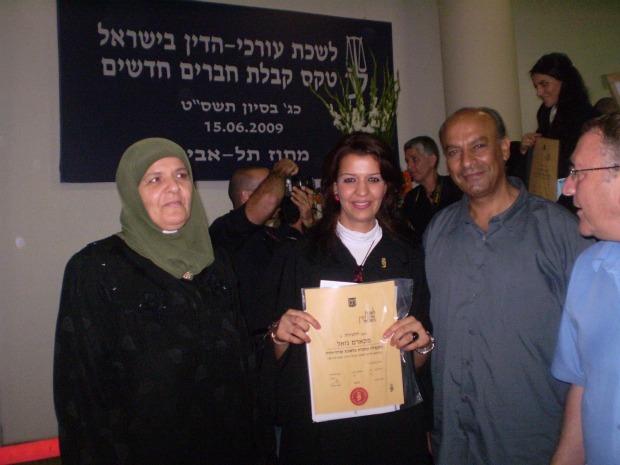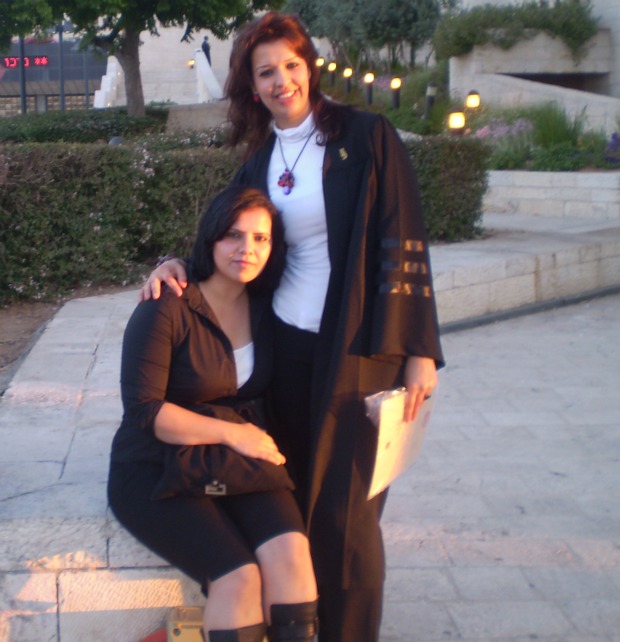I met Makarem Nazzal a few years ago when she was a shift-supervisor at New Wave Research, a company I subcontract for my projects. Dropping by one evening to monitor a survey, I was struck by her scrupulousness and precision, never to be taken for granted in the Levantine work environment here. I was also drawn to her personal charm; we began talking and became friends.
It turned out that Makarem was working her way through law school. Working full-time in shifts, she pulled off good grades, graduated and passed the Israeli bar with high marks on her first attempt.
She then looked for a job in law for about half a year. It isn’t easy for educated Arab women to find employment – according to one report, 40% of Arab women with higher education are unemployed (although another report shows that 70% of Arab women with an undergraduate degree are employed). She finally found a position she loves at a Ramat Aviv law firm, where she was quickly given a high level of responsibility.
Makarem is 26 years old. She grew up in Jaljuliya, a small Palestinian Arab town inside Israel, not far from Kfar Saba, of roughly 9,000 residents. She has four sisters and two brothers, and lives in her parents’ home. She is about to begin studying for an MBA.
WHAT’S THE SITUATION IN ISRAEL TODAY IN GENERAL?
“There’s no peace, of course, no security, no peace of mind… the top leadership just gets their salaries and they don’t care…so there is no movement towards peace. We are one of the most economically developed countries in the world, but as a state we are in critical condition. I see that in other states, Christians, Jews, and Arabs live together, but here we have tension that’s just getting worse.
…But now, many Arabs go to university and college, not like in the past. We’re entering the Jewish work sectors more, so you can learn about us, and see that it’s not all what you hear on television. In that sense, the picture is starting to improve.”
WHAT ARE YOUR PERSONAL GOALS?
“Ever since I was a kid, and now as a woman, I’ve wanted to send a message and prove that I’m equal… Every day I’m insulted that people look at me as an Arab women and they don’t believe it.
I want to succeed for me and for my family and of course I want to be economically sufficient. I want to show that there are Arab women who are educated and principled, not how the media wants to portray us… All we want is to learn and study. The sky’s the limit.
I want to invest in myself and give to society … I want my nephews grow up with extra-curricular frameworks that were missing for us. When I was small, I used to dream of learning to play the organ, but we had nothing like that in Jaljuliya; I wanted to play tennis, or learn to swim, but we have no community centers [which are common in most Jewish towns – ds]. I want my nephews to have that, I want to give to society in that way.
I want to do so many things! I want to learn English fluently, I want a PhD too. I’m always rushing, but I want more and more.”
HOW DO YOU FEEL AS A WOMAN IN SOCIETY?
“My parents always knew I would make it big – my father always said: ‘Makarem, you’re going to be something.’ … In my family, we all had to study …They expected that I would become exactly what I am now, and I proved them right. My father really wanted me to be a lawyer and I wanted it too, so they are not surprised.”
WHAT ABOUT MARRIAGE?
“The expectation of marriage creates a contradiction. I’ve gone against the flow – people were already asking to marry me in high school and I didn’t want that, I knew I wanted the freedom to study. Looking back, I realize that I missed good guys with education, from good families. I rejected them, I was very extreme. Other girls got married. I should have worked it in, and not reached this situation where I’m not married at 26. I don’t regret it, but it’s very hard.
I don’t have a framework to meet people – it’s not like you; we can’t meet people in pubs or coffee shops – now it’s only setups and I’m completely against them. I want a person whose values I know. I’m not going to change – I’m a lawyer, and he must take me as I am – he can’t tell me how to dress or live. That makes setups hard – I can sit with a guy two or three times but he won’t know Makarem.
…I really want to be a mother, but not at any price. I would never do it without a wedding! I don’t want a prince on a white horse – but he must be educated and from a good family, settled financially. I what any girl wants: to love him completely, I want huge love. I want a man of principles, a man who gives to society and is not indifferent, someone who strives to do things.”
WHAT ARE YOUR RELIGIOUS VALUES?
“I’m very, very, very traditional. I pray five times a day, starting from 4:20am, Thank God, and I read the Qur’an. I won’t let any degree or any job distract me from that…But I don’t wear a head covering, that’s the only thing that bothers me a bit…I’m afraid that if I were to wear it in Court, or in my interactions with clients, it will hold me back professionally.
I know this from experience. My sister worked for 13 years as a nurse, she was deputy to the manager of an elderly home. One day she decided she wanted to start wearing a head covering. They took her aside and asked her please not to wear it, explaining that many of the residents were Holocaust survivors. They asked her to please wear a hat instead. It’s kind of upsetting, really – it’s our religion.”
HAVE YOU EVER ENCOUNTERED RACISM?
Makarem described the heated discussions at New Wave Research during the Cast Lead operation.
“One woman said, they should go in with tanks and should wipe out the women and children…” Makarem protested. “Then there was a big argument, and everyone was against me. They didn’t hate me, they just couldn’t believe they had hurt me – but yes, they wanted to go in and wipe them out – suddenly you realize that no one cares that the city is without water and electricity. It’s not humane to say you should kill women and children! So I said to her, let’s just continue to be friends and not talk about it anymore.
Another time, when I was shift supervisor, one of the employees wasn’t doing her job. I asked her to go to her post…I said it’s not personal but that’s my job. Then she started screaming, ‘you’re a dirty Arab from Jaljuliya, no one likes you we don’t want you here!’ And management suspended her for a week.
And once I critiqued a younger worker for something professional, and she told another manager. Then she started to say, ‘You’re an Arab, you’re racist.’ She said it to the manager. They suspended her immediately, for two weeks. She called and asked to come back, complaining that the suspension was hurting her income. They said only on the condition that you apologize, and she did. Those were the things that hurt me the most in my life.”
HOW DID YOU FEEL ABOUT HOW NEW WAVE DEALT WITH IT?
“They dealt with it the best possible way. They truly respected my work and they knew how valuable I was for them…the way they handled this made it very hard for me to leave them. They always stood by me. If they hadn’t protected me I wouldn’t have stayed there a minute.”
DO YOU CONSIDER YOURSELF PALESTINIAN OR ARAB?
“It’s a hard question. It changes according to [the situation]. If I’m in an Arab country, I’m Palestinian. But …at work, I’ll say I’m Arab – not Palestinian…I respect the people I work with, and this creates tension between us, it offends them. They think Palestinians are against them.”
WHAT DO YOU THINK ABOUT THE RECENT LEGISLATIVE INITIATIVES TARGETED AGAINST ARABS? Makarem said she was only generally aware of the issue. She asked for an example, and I mentioned the recently approved Nakba Law, stating that public institutions cannot observe the Nakba on Israel’s Independence Day.
“That’s not appropriate. Where’s our democracy? We’ll be worse than Mubarak if that’s the case…It’s enough that it’s not “our” state, because the population is mostly Jewish – at least we should be able to celebrate as we want.
In truth, I don’t really feel connected to the state, even though all my friends are Jewish and very few are Arabs [she explained that this is because she did not attend high school in Jaljuliya, and for years, has worked and studied mostly with Jews]. But most of the holidays are Jewish holidays. You don’t feel yourself here as an Arab, it’s not your customs, not your habits…at least they should let us celebrate our holidays.
You know, I spent six months in Jordan. I suffered – it was total dictatorship! But at least it was nice to feel like I was among my own.
If Israel defines itself as a democratic state, it should behave according to its definition. Any day now they’ll tell us to stop celebrating the Feast of Sacrifice, because it bothers Jews… I don’t even observe the Nakba, but this is the start of something. It’s terrible – if you don’t stand up and protest, it could get worse.”
WHAT BOTHERS YOU THESE DAYS?
“What’s happening in Libya is very upsetting. But I’m very, very, very happy for Egypt. It should have happened a long time ago. The Arab states need to wake up, Mubarak should have gone down long ago. There should be young people here who want to change the government and do what they did there…
Also, the murder in the settlements recently was so awful. I was worried about going to work because I was sure it was a Palestinian. But luckily, it was a Thai worker – my father told me that it was a Thai worker, he saw it on TV…Also during the Carmel fire, it was so upsetting to find out that it was started by an Arab; again, I was worried about going to work. When they asked me at work what I think about it, I said I’d prefer to remain friends and not talk about it. When it comes to Jewish-Arab issues, I prefer not to talk about them at work.”
WHAT ARE THE POSSIBILITIES FOR A SOLUTION TO THE ISRAELI PALESTINIAN CONFLICT?
“The leadership – Netanyahu and Abu Mazen – will never ever do it. The people have to do it…If Egypt can take down Mubarak, which was least expected outcome in the world, I believe it can happen here…The people need to take things into their own hands, not wait for the leaders. The time has come to live together in peace, Jews and Arabs.”



